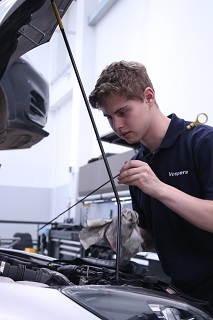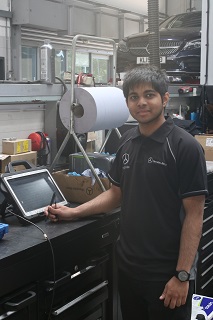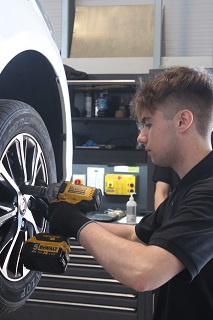How T Levels prepare learners for careers in the automotive industry
Exeter College tutors and students, and local employers, share how the Maintenance, Installation, and Repair pathway is getting learners ready for industry with a holistic education
With the introduction of the new Engineering and Manufacturing T Level in 2022 and the defunding of overlapping qualifications in 2025 approaching, it’s a great time for colleges and training providers to get on board with the new technical option for 16- to-19-year-olds.
The T Level in Engineering and Manufacturing is comprised of 80% classroom or workshop-based training and 20% relevant industry placement, with learners picking one of three pathways depending on their interests: Maintenance, Installation & Repair; Engineering, Manufacturing, Processing & Control or Design & Development. Learners then choose their occupational specialism, with several available for each pathway, each designed to prepare them for careers within specific occupations.
Exeter College was one of the first providers to introduce the Maintenance, Installation & Repair pathway as an option, offering their learners the opportunity to choose between two occupational specialisms to receive their training in.
Choosing T Levels
 For decision makers at Exeter College, choosing to offer the Light and Electric Vehicles occupational specialism was based on multiple factors, including the compatibility of existing facilities and the opportunities for industry placements with businesses in the area.
For decision makers at Exeter College, choosing to offer the Light and Electric Vehicles occupational specialism was based on multiple factors, including the compatibility of existing facilities and the opportunities for industry placements with businesses in the area.
These existing resources, combined with the additional funding available specifically for T Levels, made the automotive faculty confident that they were ready to offer this T Level pathway and this enthusiasm was matched by the learners they enrolled.
Discussing the initial success, John Dudley, Programme Lead for Engineering at Exeter College, shared: “We’ve invested in, modified, and changed some of the physical environment to make sure that we can cater for this programme because we know that we’ve had the throughput of learners wanting to do our automotive provision for many, many years. And we can’t see that changing with the T Level offer. As soon as we put it out there last September, we got a nice healthy group of learners and we have had a further 30% increase in enrolments this year compared to last, showing that interest is being converted into applications.”
“We have had a further 30% increase in enrolments this year compared to last, showing that interest is being converted into applications.”
The industry placement
For these learners, choosing the T Level was based on multiple factors, but the specific mix of classroom or workshop-based training and an opportunity to experience industry life through a placement really stood out for Brandon who is working with Snows Toyota:
“I chose the T Level because it gives me a mix of academic work, but also gives me a head start in getting a career with the work experience that’s included in the programme. Having that one day a week work experience helps keep me refreshed and helps me develop some real-world knowledge... It gives me a foothold into a career, by making it much easier when I leave college to have an idea, and possibly an opportunity, of somewhere to go.”
 “The T Level gives me a mix of academic work, but also gives me a head start in getting a career with the work experience that’s included in the programme.”
“The T Level gives me a mix of academic work, but also gives me a head start in getting a career with the work experience that’s included in the programme.”
For the employers offering industry placements, existing relationships with the college through other qualifications proved important in making the decision to get involved with T Levels. Beyond this, there’s a strong desire to give young people an insight into their world and make sure they have the skills they need to make a positive impact.
Steve Johnson, General Service Manager at Mercedes Benz Exeter explained: “Young people and apprentices are the way forward for the trade. I think there’s too many people with no training, working on all types of cars. And more so now with electric vehicles… We can give them an insight into what the industry is about, and I feel like we do it properly.”
Employers like Mercedes are using the placement part of the T Level as an opportunity to give learners a range of experience, as Steve added: “We move them around a little bit. We’ve got three levels of technician – maintenance technicians, systems technicians and diagnostic technicians. We’ve given them a little bit of time with each, so they get a view of what each is.”
Another priority for Steve was giving learners an insight into the day-to-day realities of an automotive role. “There are so many parts to the job, it’s not just about fixing cars there’s a lot of administration that goes on,” he explained. “There’s a lot of ordering parts, making sure we get the right parts in the right place at the right time. They get a good overview of what’s going on.”
The on-programme experience
Speaking about the teaching process, Exeter College’s programme team lead John Dudley commented: “A T Level does have the chance to go off-piste a little and be a bit more holistic. [There’s an opportunity to] have more in-depth conversations about other things, because the priority is not to get an assignment in, the priority is to gather knowledge that will help in an Employer-Set Project and an end of year Core Exam. So, that’s quite fresh. It’s given us the chance to just be teachers, and a little bit less driven by learning outcomes and aims – or a pass, merit or distinction criteria.”
“It’s given us the chance to just be teachers, and a little bit less driven by learning outcomes and aims – or a pass, merit or distinction criteria.”
The combination of this more holistic approach and the industry placement is giving learners an experience that blends the theory and the practical side of what they’re studying. Rory, who is completing his placement with Vospers Ford, has particularly valued the relationship between college and the workplace:
“The placement and the practical lessons within the workshops in college really tie into each other. If there’s something we might have encountered on placement that we were unsure of or we might not have understood properly, we can feed that back to college, and we might start covering that in the lesson. And some of the things we do at college have prepared us for things we encounter within the workplace. It’s really nice to go into a workplace environment and to already understand it.”
“The placement and the practical lessons within the workshops in college really tie into each other.”
Of course, as with any new qualification there are bound to be some initial challenges as adjustments are made by all parties. The team at Exeter College have been working hard to make sure that these challenges do not impact the eventual success of the learners. For example, although the 17 core modules necessary for the T Level have created a high workload, the assessment model has permitted for some much-appreciated flexibility.
Importantly for the college, they have had support every step of the way as they adapt, as John shared: “The team at City & Guilds always offers useful and valuable webinars and online events. I try to attend as many as possible…The documentation is good, and the offer of support is very good.”
What’s next for Team T Level?
While T Levels have been designed to allow for the option of university enrolment upon their completion, the majority of learners on this programme are more interested in staying in the workplace and John is confident that Exeter College’s learners will have their fair share of opportunities upon graduation: “The concept of having employer engagement from the get-go, is great. I can see from our employers that are currently engaged with our learners; a selection of real-world opportunities being offered at the end of the programme. Within weeks, we had feedback from employers saying what tremendous learners we've got. And they're already over the moon, by the calibre of the learners.”
 “We had feedback from employers saying they're over the moon by the calibre of the learners.”
“We had feedback from employers saying they're over the moon by the calibre of the learners.”
This opportunity for both employers and learners to do a kind of workplace test-run has encouraged both sides to feel optimistic about future possibilities. Mercedes’ General Service Manager Steve Johnson has a very positive view on the experience of working with T Level learners: “It's been rewarding, really, because they come in and they're young people and they love it. They need somebody to give them a start.”
Renzil who has been completing his placement with Mercedes, feels this has given him an advantage over other people his age without similar experience: “Someone who is doing A Levels, who is only studying now, they won’t know what it’s like in the workplace. But if you choose T Levels, you have a better perspective of how this is going to be, if in the future you get a job in that sector.”
For Brandon, working towards this T Level and the experience he has had so far with Snows Toyota has encouraged his desire to progress with the company: “The idea that I'm most secure with at the moment is doing an apprenticeship with Snows [Toyota]. And then after that either get a job at Snows [Toyota] or use that experience I've had with the industry placement and the apprenticeship to go somewhere else or try and find something else to invest myself into. Because I then would have the skills of having the apprenticeship and the work experience.”
Just over a year on from the start of the programme, Exeter College, the employers they work with, and their learners are already starting to see the benefits of T Levels.
If you’re interested in delivering one or more T Levels sign up here for more information.
Or visit the government’s Register to offer T Levels page for more information on how to register.
If you’re an employer who would like to get involved by offering industry placements for learners then find a local college here: T Levels and industry placement support for employers.